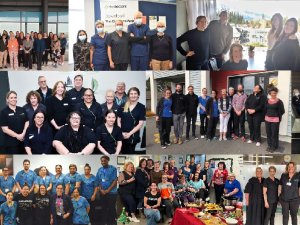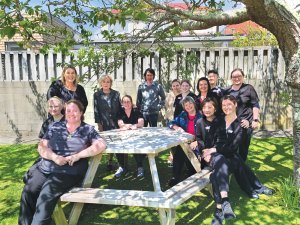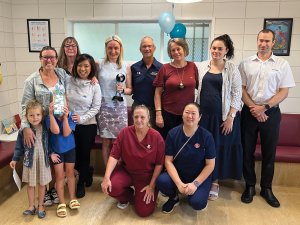Respiratory physician Lutz Beckert considers chronic obstructive pulmonary disease management, including the prevention of COPD, the importance of smoking cessation and pulmonary rehabilitation, and the lifesaving potential of addressing treatable traits. He also discusses the logic of inhaler therapy, moving from single therapy to dual and triple therapy when indicated, as well as other aspects of management
Coughs, colds and cancer: CareHQ telehealth sees it all
Coughs, colds and cancer: CareHQ telehealth sees it all

Driven by a mission to bridge gaps in patient care, CareHQ serves as a telehealth lifeline, providing consultations to patients who face long wait times or limited access to their primary care physicians, reports Zahra Shahtahmasebi
With its tagline of “See a GP anywhere”, CareHQ is not your typical general practice. The digital service has no fixed abode. Instead, its GPs are scattered across the country – even internationally.
Chief medical officer Reza Jarral says CareHQ provides a telehealth bridge between patients and their usual general practice. If they can’t see their GP because of long wait times, CareHQ takes care of them.
Since the end of 2020, CareHQ doctors and nurses have dealt with coughs, colds and flu, detected cancers, and helped Kiwis with terminal illnesses deal with their pain: “You never would expect this from an app on your phone,” says Dr Jarral, a specialist GP.
CareHQ, a joint venture between ProCare PHO and Southern Cross Health Society, came into being at the end of 2020, right in the thick of COVID-19.
The pandemic played a role in the service’s launch, but the genesis of the idea came well before that from workshops with general practice staff which found the average clinic was struggling to meet the demands of its patients, says Dr Jarral.
If patients could not see their own GP, they would go to urgent-care centres or emergency departments.
Often, this incurred clawback fees or the loss of that patient’s capitation for the enrolling practice.
So CareHQ’s kaupapa became all about partnering with practices and helping them by providing overflow and after-hours care that was safe, equitable and responsible, says Dr Jarral. The service handles the care of these patients virtually until it’s time to discharge them or return them to their GP if they need further care.
He points out that, unlike some other digital-first providers, CareHQ doesn’t enrol patients nor charge clawback fees: “We define ourselves as an episodic, high-quality service provider, not someone who is going to replace the continuity of care.”
CareHQ offers GP appointments, an international visitors’ service for non-residents and a return-to-work service on a fee-for-service model. Standard GP consults are available seven days a week from 7am to 7pm for $79.95 and after hours from 7pm to 9pm for $89.95. The cost is more than a standard general practice to not act as a competitor but less than an urgent-care clinic, says Dr Jarral.
A fundamental tenet of CareHQ is to make healthcare more accessible to all New Zealanders. In 2023, it partnered with Auckland City Mission Te Tāpui Atawhai to launch a hybrid telehealth clinic for homeless whānau. The combination of having nurses on the ground who knew the people and a remote doctor worked well – the impact was enormous, says Dr Jarral.
Since it began, CareHQ has delivered 60,000 consults, with 96 per cent of users giving it a four or five-star rating. The service sees a “very healthy” mix of patients, including those with elevated levels of health literacy who don’t need to be seen in person to those with high needs who wouldn’t receive care for weeks or even months if it weren’t for CareHQ, says Dr Jarral.
Sixty per cent of users are between 25 to 44, and 60 per cent are women. Most patients identify as New Zealand European, then Asian, Indian and Māori. Most of the users live in Auckland, followed by Christchurch.
If the consultation cost is a barrier, help is available for patients through coupons from their practice, schemes like ProCare’s UnifyHealth, which uses PHO funding to subsidise the consultation fee, or through an insurance provider or employer.
A challenge for CareHQ and patients is New Zealand’s fragmented health system, says Dr Jarral, with different services, DHBs, software and note-sharing systems that don’t talk to each other.
“When we try to navigate patients from the top of the North Island to the bottom of the South Island, we have to create a colour-coded atlas.”
The team treat all the usual conditions – coughs and colds, food poisoning, skin conditions, eczema, rashes and COVID-19. Then there’s the unexpected, like detecting blood cancer in a woman who presented with back pain. She had a five-week wait to see her GP, so CareHQ organised blood tests and x-rays. When the results came back, the GP spotted the cancer and within five days, she was seen by a haematologist.
“I’ve got about 60 examples like this; we shouldn’t be able to do this...We’re a bit of a canary in the coal mine; we see which parts of New Zealand are underserved,” says Dr Jarral.
This also includes those who can’t enrol in a practice because their local GP’s books are closed or no GP is based in the area.
Recently, CareHQ helped a homeless woman in Northland who needed follow-up by meeting her immediate needs and then contacting Mahitahi Hauora PHO, which has a service for unenrolled patients.
“We have large volumes of patients, but on an individual level, we make sure we concierge each patient to where they need to go,” Dr Jarral says.
If there is no GP at all, CareHQ provides remote care, working alongside local practice nurses. In some cases, the service has sent a GP to an area if the community needed it.
“We’ve supported aged-care facilities, student services, hundreds of practices who don’t have a doctor in the building for months or years,” says Dr Jarral.
CareHQ brings together a diverse and talented group of people committed to delivering quality care, says Dr Jarral. “He tangata, he tangata, he tangata – it’s all about the people…If you dig down, you see the stories we keep to remind us who we are and why we do it.”
CareHQ consists of a team of 50, made up of 40 GPs, four nurses and a core practice team of six.
Those GPs are all fellows of RNZCGP and are located across New Zealand and overseas, including Australia, the UK, the US and Vietnam. Dr Jarral says this makes CareHQ the only primary care service in New Zealand exclusively run by GP fellows. This is crucial because telemedicine is inherently high risk, given providers don’t know the patient.
He notes the GPs tend to be over 60 and approaching retirement or they’re new parents who want flexible shifts they can do from home.
CareHQ helps both groups stay in the game and keep practising when they otherwise might not, Dr Jarral says. A quote from a senior GP corroborates this: “CareHQ has put the joy back in medicine for me – I’m able to concentrate on my patients and not think about inboxes and audits.”
To have such a dedicated team of GPs in the middle of a workforce shortage is surprising for any primary care service, but Dr Jarral says it’s due to the workload balance, the culture and the remuneration CareHQ offers.
“We don’t have capitation or recurring revenue from other sources; we put everything we have back into our GPs and into our services.
“The business model is challenging, but we’re sticking to it because it’s the right thing to do.”
CareHQ manages patients from start to finish, including any investigations and referrals. But the workload is split among the team – the GPs clock in, see their patients, and then clock out again without having to worry about dealing with emails and administrative work, which is dealt with by a team of GP fellows and registered nurses.
“Our mechanisms are so tight…We share the care between dozens of people, and no one gets lost,” says Dr Jarral.
While the team is geographically widespread, CareHQ ensures staff feel like they are part of a family, with continuing medical education sessions, online peer-group meetings, group chats, and in-person events from time to time.
Zahra Shahtahmasebi is an Auckland journalist
TELL US WHAT YOU THINK
You can add your comments using the comment function below, or by sending a Letter to the Editor to editor@nzdoctor.co.nz
We're publishing this article as a FREE READ so it is FREE to read and EASY to share more widely. Please support us and our journalism – subscribe here
One of the benefits of subscribing is you will also be able to share your thoughts about what you read with others in our Comment Stream. You can also take notes on what you read with Capture









![Barbara Fountain, editor of New Zealand Doctor Rata Aotearoa, and Paul Hutchison, GP and senior medical clinician at Tāmaki Health [Image: Simon Maude]](/sites/default/files/styles/thumbnail_cropped_100/public/2025-03/Barbara%20Fountain%2C%20editor%20of%20New%20Zealand%20Doctor%20Rata%20Aotearoa%2C%20and%20Paul%20Hutchison%2C%20GP%20and%20senior%20medical%20clinician%20at%20T%C4%81maki%20Health%20CR%20Simon%20Maude.jpg?itok=-HbQ1EYA)
![Lori Peters, NP and advanced health improvement practitioner at Mahitahi Hauora, and Jasper Nacilla, NP at The Terrace Medical Centre in Wellington [Image: Simon Maude]](/sites/default/files/styles/thumbnail_cropped_100/public/2025-03/2.%20Lori%20Peters%2C%20NP%20and%20advanced%20HIP%20at%20Mahitahi%20Hauora%2C%20and%20Jasper%20Nacilla%2C%20NP%20at%20The%20Terrace%20Medical%20Centre%20in%20Wellington%20CR%20Simon%20Maude.jpg?itok=sUfbsSF1)
![Ministry of Social Development health and disability coordinator Liz Williams, regional health advisors Mary Mojel and Larah Takarangi, and health and disability coordinators Rebecca Staunton and Myint Than Htut [Image: Simon Maude]](/sites/default/files/styles/thumbnail_cropped_100/public/2025-03/3.%20Ministry%20of%20Social%20Development%27s%20Liz%20Williams%2C%20Mary%20Mojel%2C%20Larah%20Takarangi%2C%20Rebecca%20Staunton%20and%20Myint%20Than%20Htut%20CR%20Simon%20Maude.jpg?itok=9ceOujzC)
![Locum GP Helen Fisher, with Te Kuiti Medical Centre NP Bridget Woodney [Image: Simon Maude]](/sites/default/files/styles/thumbnail_cropped_100/public/2025-03/4.%20Locum%20GP%20Helen%20Fisher%2C%20with%20Te%20Kuiti%20Medical%20Centre%20NP%20Bridget%20Woodney%20CR%20Simon%20Maude.jpg?itok=TJeODetm)
![Ruby Faulkner, GPEP2, with David Small, GPEP3 from The Doctors Greenmeadows in Napier [Image: Simon Maude]](/sites/default/files/styles/thumbnail_cropped_100/public/2025-03/5.%20Ruby%20Faulkner%2C%20GPEP2%2C%20with%20David%20Small%2C%20GPEP3%20from%20The%20Doctors%20Greenmeadows%20in%20Napier%20CR%20Simon%20Maude.jpg?itok=B0u4wsIs)
![Rochelle Langton and Libby Thomas, marketing advisors at the Medical Protection Society [Image: Simon Maude]](/sites/default/files/styles/thumbnail_cropped_100/public/2025-03/6.%20Rochelle%20Langton%20and%20Libby%20Thomas%2C%20marketing%20advisors%20at%20the%20Medical%20Protection%20Society%20CR%20Simon%20Maude.jpg?itok=r52_Cf74)
![Specialist GP Lucy Gibberd, medical advisor at MPS, and Zara Bolam, urgent-care specialist at The Nest Health Centre in Inglewood [Image: Simon Maude]](/sites/default/files/styles/thumbnail_cropped_100/public/2025-03/7.%20Specialist%20GP%20Lucy%20Gibberd%2C%20medical%20advisor%20at%20MPS%2C%20and%20Zara%20Bolam%2C%20urgent-care%20specialist%20at%20The%20Nest%20Health%20Centre%20in%20Inglewood%20CR%20Simon%20Maude.jpg?itok=z8eVoBU3)
![Olivia Blackmore and Trudee Sharp, NPs at Gore Health Centre, and Gaylene Hastie, NP at Queenstown Medical Centre [Image: Simon Maude]](/sites/default/files/styles/thumbnail_cropped_100/public/2025-03/8.%20Olivia%20Blackmore%20and%20Trudee%20Sharp%2C%20NPs%20at%20Gore%20Health%20Centre%2C%20and%20Gaylene%20Hastie%2C%20NP%20at%20Queenstown%20Medical%20Centre%20CR%20Simon%20Maude.jpg?itok=Z6u9d0XH)
![Mary Toloa, specialist GP at Porirua and Union Community Health Service in Wellington, Mara Coler, clinical pharmacist at Tū Ora Compass Health, and Bhavna Mistry, specialist GP at Porirua and Union Community Health Service [Image: Simon Maude]](/sites/default/files/styles/thumbnail_cropped_100/public/2025-03/9.%20Mary%20Toloa%2C%20Porirua%20and%20Union%20Community%20Health%20Service%20in%20Wellington%2C%20Mara%20Coler%2C%20T%C5%AB%20Ora%20Compass%20Health%2C%20and%20Bhavna%20Mistry%2C%20PUCHS%20CR%20Simon%20Maude.jpg?itok=kpChr0cc)